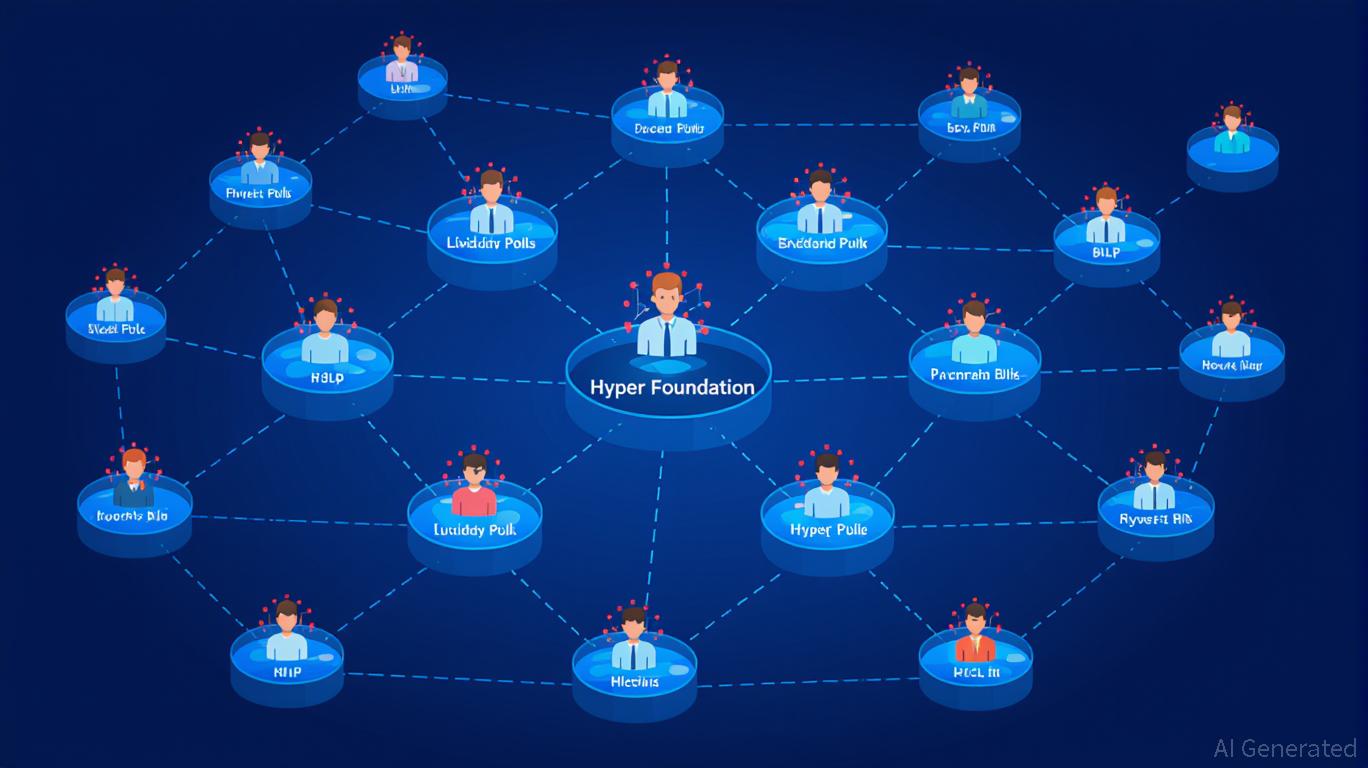TWT's Updated Tokenomics Framework: Driving Sustainable Value and Expanding the DeFi Ecosystem
- Trust Wallet's 2025 TWT tokenomics shift prioritizes utility over governance, using Trust Premium's XP system to drive user engagement and retention. - Strategic integrations like FlexGas (transaction fee payments) and Ondo Finance's RWAs expand TWT's cross-chain utility, bridging DeFi and traditional finance. - TWT's loyalty-driven model reduces circulating supply through locking mechanisms, contrasting inflationary approaches while attracting institutional investors. - Binance's reduced collateral rati
A Utility-Driven Flywheel: TWT as the Engine of Engagement
Trust Premium creates a gamified environment where participants collect Trust XPs by performing on-chain actions such as swapping, staking, and holding digital assets. These experience points unlock progressive rewards (Bronze → Silver → Gold), including reduced gas fees, lower swap charges, and priority access to new features. Central to this system is TWT: owning or locking TWT speeds up XP accumulation and enhances user benefits, as highlighted by
This setup establishes a self-sustaining flywheel. Increased interaction with Trust Wallet’s platform boosts the practical value of TWT holdings, which helps decrease selling pressure and encourages users to stay long-term. Trust Wallet CEO Eowyn Chen describes TWT as "the fuel for a sustainable growth flywheel," directly linked to the platform’s expansion, according to

Strategic Partnerships and Cross-Chain Utility
TWT’s appeal is further enhanced by strategic alliances that broaden its role beyond governance. The introduction of FlexGas in August 2025 enables users to pay transaction fees with TWT, USDT, or
Moreover, Trust Wallet’s partnership with Ondo Finance has introduced real-world assets (RWAs) such as U.S. Treasury bonds to the blockchain, using TWT as a connector between decentralized and traditional finance, as mentioned by
Token Supply Dynamics: A Balancing Act
Although Trust Wallet’s 2025 updates do not provide specific details about TWT’s supply or inflation, the structure suggests an emphasis on supply-side stability. Locking TWT for premium access reduces the available supply, potentially making the token more scarce. This approach differs from tokens like
The lack of clear inflation data for TWT may be intentional, possibly to encourage user participation. Still, the loyalty-based system naturally limits speculative selling by connecting token worth to active involvement in the ecosystem. This strategy reflects a wider industry movement toward prioritizing utility over inflation, as reported by
Challenges and Risks
Despite its advantages, TWT’s framework is not without obstacles. Binance’s decision to lower TWT’s collateral ratio from 60% to 45% could reduce leveraged trading and institutional involvement, as
Conclusion: A Blueprint for Sustainable DeFi Growth
TWT’s revised tokenomics present a bold new vision for how DeFi tokens can foster ecosystem expansion. By focusing on practical use, user participation, and strategic alliances, Trust Wallet is shaping TWT into a versatile asset that connects decentralized and traditional finance. While there are still challenges ahead, the emphasis on building lasting value rather than chasing short-term gains provides a promising model for sustainable growth in the DeFi sector.
Disclaimer: The content of this article solely reflects the author's opinion and does not represent the platform in any capacity. This article is not intended to serve as a reference for making investment decisions.
You may also like
Stellar News Today: Blockchain Opens Up Clean Energy Investment Opportunities While Turbo Taps Into $145B EaaS Sector
- Turbo Energy partners with Stellar and Taurus to tokenize solar energy financing via blockchain, targeting Spain's supermarket sector. - The pilot uses Energy-as-a-Service (EaaS) models with tokenized PPAs, enabling fractional investor ownership and reducing capital barriers. - Blockchain streamlines liquidity and transparency, aligning with a $145B EaaS market growth projection by 2030 driven by sustainable infrastructure demand. - Taurus manages token compliance via its platform, while Stellar's low-co
Ethereum Updates: Major Holders Increase Their Ethereum Stash Fivefold While BTC/ETH ETFs See Outflows—Altcoins Draw in $126 Million
- Bitcoin and Ethereum spot ETFs lost $605M in outflows, contrasting with $126M inflows into Bitwise's Solana ETF (BSOL), highlighting shifting investor priorities toward altcoins. - Ethereum's largest whale quintupled ETH holdings to $138M while closing Bitcoin longs, reinforcing institutional confidence in Ethereum's long-term potential amid stable technical indicators. - Solana's ETF success ($545M total inflows) reflects growing institutional demand for altcoins despite 16% price declines, driven by it
Red Bull Racing’s advantage? An engineer who approaches workflows with the precision of timing laps
Hyperliquid's Growing Influence in Crypto Trading: Can It Maintain Long-Term Investment Appeal?
- Hyperliquid dominates 80% of 2025 perpetual contract market via on-chain governance and user-driven liquidity innovations. - Centralized governance (HIP-3 protocol, USDH stablecoin launch) balances permissionless market creation with validator dominance risks. - HLP liquidity model generates $40M during crashes but faces regulatory scrutiny and token economics challenges from 2025 HYPE unlock. - TVL growth to $5B and 518K active addresses highlight adoption, yet governance centralization and institutiona
